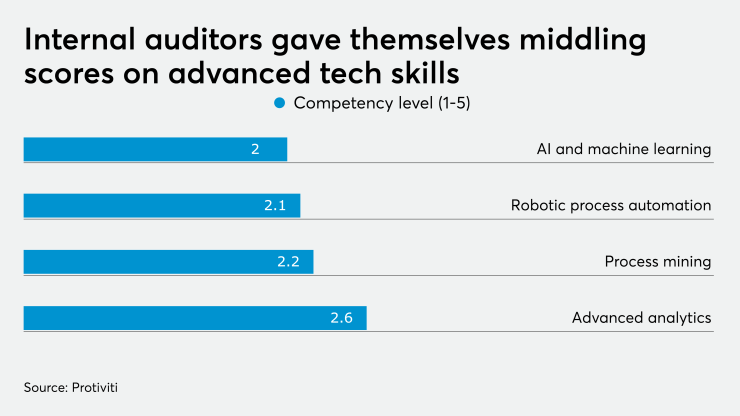Internal audit departments are slowing down the adoption of next-generation technologies, such as artificial intelligence and machine learning, according to a new survey.
The
The study was finished in the first quarter of this year, but was based on a poll conducted in the fourth quarter of last year, before the novel coronavirus pandemic began spreading across the U.S. The release of the study was delayed until now as businesses have reacted and adjusted to the new environment.
However, Protiviti pointed out that COVID-19 has exacerbated the existing challenges facing traditional internal audit functions, who run the risk of becoming obsolete. The pandemic has widened the gap between internal audit functions’ competence in areas such as governance, methodology and technology, and the skills needed to add value to modern-day organizations.
"We continue to advocate for the embrace of a next-generation internal audit mindset and the adoption of the governance, methodology and enabling technology competencies that will position internal audit functions to best support their organizations as they strive to transform amid this pandemic and in the years to come," said Brian Christensen, executive vice president of global internal audit at Protiviti, in a statement Wednesday.
He believes next-generation audit technologies should be more of a priority for the internal audit function.
Only 10 percent of the survey respondents said they’re doing process mining — a form of analytics that uses transactional data captured by enterprise systems to analyze and visualize how processes are actually being performed — in their internal audit function, while 41 percent of respondents said they have no plans to adopt this technology at all.
When the survey respondents were asked, on a scale of 1 to 5, to assess their own competency in different types of technology — such as robotic process automation, process mining, advanced analytics, AI and machine learning — they gave themselves middling scores of between 2 and 3. The internal audit function’s exploration and adoption of technologies such as these lags behind other key business functions such as finance.






